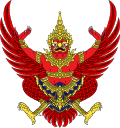| | |||||||||||
2 March 2008 | |||||||||||
76 of the 150 seats in the Senate | |||||||||||
This lists parties that won seats. See the complete results below. | |||||||||||
 |
|---|
| |
Senate elections were held in Thailand on 2 March 2008, the first under a new constitution. Voter turnout was 56%. [1] Results were expected on 9 March 2008. [2]
76 candidates were elected, one for each province, while 74 senators will be nominated by a selection panel headed by the Constitution Tribunal's president Virat Limvichai. Nominations for these seats were made by professional groups between 13 January and 18 January 2008, whereafter a panel appointed by the Electoral Commission vetted the nominees' credentials before forwarding the nominations to the selection panel. [3] The Thai Election Commission endorsed the 74 senators selected from the nominations. [4] The senators will serve six-year terms.
The nominated senators are considered to be closer to the outgoing military administration, [5] while among the elected senators a substantial number are closely connected to deposed former PM Thaksin. A prominent critic of Thaksin and anti-corruption activist also appeared to have been elected. [6]
